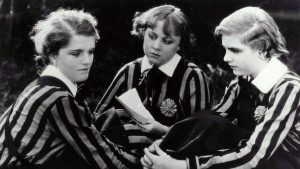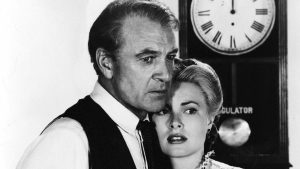Tuesday, January 14 at 7pm
LITTLE JOE – Exclusive Area Premiere!
Jessica Hausner (Austria/UK/Germany 2019) 105 min. DCP. With Emily Beecham, Ben Whishaw.
A gloss on Frankenstein like nothing you’ve seen before, Hausner’s funny and philosophical latest furthers her interests in genre cinema, group dynamics and the possibility of the fantastic in an increasingly technocratic world. Emily Beecham (awarded Best Actress at Cannes for this role) stars as Alice, a single mother and scientist who, along with her lab partner (Whishaw), is conducting experiments to create a new species of plant, a crimson flower whose scent induces happiness. Of course their happy-making plant turns out to have an agenda of its own, and what had once been a potential cash cow begins to seem increasingly like something out of Invasion of the Body Snatchers (Film at Lincoln Center notes).
TOP OF PAGE
Tuesday, January 21 at 7pm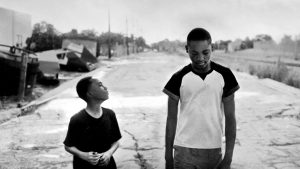
WHAT YOU GONNA DO WHEN THE WORLD’S ON FIRE? – Exclusive Area Premiere!
Roberto Minervini (Italy/US/France 2018) 123 min. DCP.
Shot in luminous black and white, the latest from Italian-born, Texas based Roberto Minervini delves into the everyday lives of Black Americans fighting for justice and survival in the summer of 2017, weaving between wrenching storylines in New Orleans and Jackson County, Mississippi. Minervini immerses himself in the communities in which he works, and the results are often revelatory, yielding intimate and visceral moving images of rarely seen lives on the margins. What You Gonna Do observes Judy Hill, who strives to keep her family and friends afloat as her bar is threatened; the two young brothers Ronaldo and Titus, whose neighborhood is plagued by violence; and The New Black Panthers, who carry out a people’s investigation of a killing attributed to the Ku Klux Klan. This is a film of urgency, community, righteous anger and grace (Adapted from TIFF notes written by Andréa Picard).
TOP OF PAGE
Tuesday, January 28 at 7pm
MÄDCHEN IN UNIFORM – Restoration!
Leontine Sagan (Germany 1931) 88 min. DCP. With Dorothea Wieck, Hertha Thiele, Emilia Unda. With German with English subtitles. Starring an all-female cast, Mädchen in Uniform is an enduring classic of lesbian cinema. A sensitive new arrival at a school for the daughters of military officers becomes hopelessly smitten with a charismatic teacher, eliciting the wrath of the headmistress. Made on the eve of Nazi ascendance, the film stands as a nuanced parable of authoritarianism, yet it’s also a moving portrait of burgeoning sapphic desire, rendered with great technical skill. “With this work the pre-war German sound film reached its highest level,” the film historian Lotte Eisner observed. “Leontine Sagan, a stage-actress… brings out the unselfconscious naïvety of the boarders’ confidences whispered across the dormitory, and the flush of love trembling in the cracked voice of the adolescent” (Adapted from Film at Lincoln Center notes). Co-presented with Bucknell’s Womens and Gender Studies program. Introduced by Literary Studies graduate student Emma Downey.
“Mädchen in Uniform is a film about sexual repression in the name of social harmony, about the absent patriarchy and its forms of presence, about bonds between women which represent attraction instead of repulsion, and about the release of powers that can accompany the identification of a lesbian sexuality… The first lesson of [the film] is that lesbianism has a much larger and finer history than we often suspect, that the film indicates as much, and that we need to do ever more work on reconstructing the image of lesbian culture that has been so painfully erased. The second lesson is that, in looking backward and inward, we cannot afford to stop looking forward and outward.” – B. Ruby Rich
THE BLUE ANGEL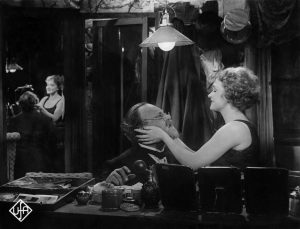
Josef von Sternberg (Germany 1930) 106 min. 35MM. With Emil Jannings, Marlene Dietrich, Hans Albers, Kurt Gerron. German with English subtitles.
This is the film that made Marlene Dietrich an international icon, with the role of Lola Lola, a performer in a cabaret dripping with atmospheric Weimar sleaze. Lola’s coarse crooning and signature costume—white top hat, black stockings, and little else—make the customers drool over their liverwurst, and reduce Emil Jannings’ prim professor to a groveling, crowing caricature of masochistic compulsion. Although the Dietrich on view here is looser and more casually funny than the carefully sculpted creature of the later films, her aura of sexual confidence was established from the start, and The Blue Angel’s wallow in erotic obsession would, rightly or not, color critical views of the entire Sternberg-Dietrich collaboration (Adapted from Pacific Film Archive notes). Co-presented with the Department of Theatre & Dance, and introduced by Professor Dustyn Martincich.
TOP OF PAGE
Tuesday, February 11 at 7pm
HIGH NOON
Fred Zinnemann (U.S. 1952) 85 min. DCP. With Gary Cooper, Grace Kelly, Katy Jurado, Lloyd Bridges.
No movie hero ever walked taller than Gary Cooper in High Noon. As Marshal Will Kane, he’s ready to turn in his badge and settle down with his new wife (Kelly) until he learns a criminal is arriving on the noon train bent on revenge. When the locals turn a deaf ear to Kane’s pleas for help (even deputy Lloyd Bridges refuses), the lawman must face a gang of killers alone. This iconic Western, named by the American Film Institute as one of the 100 greatest films of all time, won four Oscars, including a Best Actor award for Cooper and Best Song for “Do Not Forsake Me, Oh My Darlin’” (American Cinematheque program notes). Co-presented by the Literary Studies Program, and introduced by English Professor Alf Siewers, in conjunction with his course Terror with a Human Face.
TOP OF PAGE
Tuesday, February 18 at 7pm
L’ECLISSE
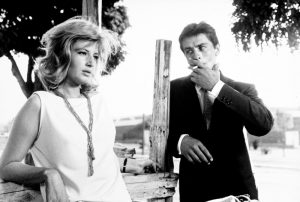
Michelangelo Antonioni (Italy/France, 1962) 125 min. 35MM. With Monica Vitti, Alain Delon, Lilla Brignone, Francisco Rabal. Italian with English subtitles.
The concluding chapter of Michelangelo Antonioni’s informal trilogy on contemporary malaise (following L’avventura and La notte), L’eclisse tells the story of a young woman (Vitti) who leaves one lover (Rabal) and drifts into a relationship with another (Delon). Using the architecture of Rome as a backdrop for the doomed affair, Antonioni achieves the apotheosis of his style in this return to the theme that preoccupied him the most: the difficulty of connection in an alienating modern world. Introduced by Philosophy Professor Adam Burgos in conjunction with his course Critical Theory.
TOP OF PAGE
Tuesday, February 25 at 7pm
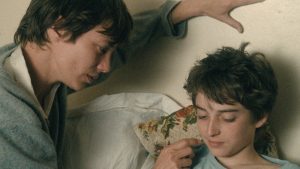
KUNG-FU MASTER!
Agnès Varda (France 1987) 81 min. With Charlotte Gainsbourg, Jane Birkin, Mathieu Demy. French with English subtitles.
A truly bold, transgressive, lovely and singular film, Kung-Fu Master! is the tale of a lonely forty-year-old woman who falls in love with the classmate of her teenage daughter. Varda, one of cinema’s towering visionaries, died last year, leaving us with a vast oeuvre of personal, whimsical and fearless films. Here, she proffers pure, maternal love (innocent and consuming) crossed with the intimacy of physical desire – a provocation whose backdrop is the ongoing AIDS crisis. A director who said she preferred daydreams to psychology, Varda cast this memorable fantasy with her own and her lead actress’ family: Jane Birkin (a national figure in France, celebrated for her work as an actress as well as her liaison with singer-songwriter Serge Gainsbourg) stars, appearing with her two reallife daughters (Charlotte Gainsbourg and Lou Doillon, her child with filmmaker Jacques Doillon); the young man is played by Mathieu Demy, Varda’s son with the director Jacques Demy.
“Groundbreaking feminist filmmaking from two people who were ahead of their time in exploring modern ideas about women as mothers, artists and individuals.” – Katie Walsh, Los Angeles Times
TOP OF PAGE
Tuesday, March 3 at 7pm
THE LAST TEMPTATION OF CHRIST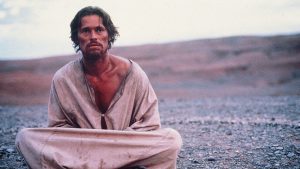
Martin Scorsese (U.S. 1989) 164 min. 35MM. With Willem Dafoe, Barbara Hershey, Harvey Keitel, Harry Dean Stanton, David Bowie.
A towering achievement and among the most controversial, heavily protested American films of the late 20th century, Scorcese’s passion project can now be viewed as the remarkable, profoundly personal work of faith that it is. This fifteen-year labor of love, an adaptation of Nikos Kazantzakis’s landmark novel that imagines an alternate fate for Jesus Christ, features outstanding performances by celebrated actors; bold cinematography by the great Michael Ballhaus; and a transcendent score by Peter Gabriel. Co-sponsored by Bucknell’s Religious Studies department and introduced by Professor John Penniman.
TOP OF PAGE
Tuesday, March 17 at 7pm
ALPHAVILLE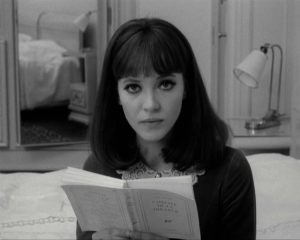
Jean Luc-Godard (France 1965) 99 min. DCP. With Eddie Constantine, Anna Karina, Akim Tamiroff, László Szabó. French with English subtitles.
A French New Wave icon, and the muse of Jean-Luc Godard (also his wife for a time), Anna Karina died this past winter, leaving evidence of a prosperous acting career in European cinema (working with directors including Luchino Visconti, Tony Richardson and Jacques Rivette). Alphaville may be one of Godard’s more peculiar and mysterious movies, a fusion of dystopian science-fiction, pulp characters and surrealist poetry. Eddie Constantine stars as intergalactic hero Lemmy Caution, on a mission to kill the inventor of fascist computer Alpha 60 – and teach the scientist’s beautiful daughter (Karina) the meaning of the word “love”.
“To understand Alphaville is to understand Godard!” — Andrew Sarris
Tuesday, March 24 at 6:30pm
*PLEASE NOTE EARLIER START TIME
PERSONAL PROBLEMS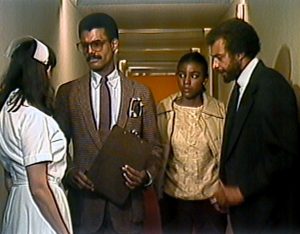
Bill Gunn (U.S. 1980) 165 min. DCP. With Vertamae Grosvenor, Walter Cotton, Ishmael Reed.
This entirely African American-conceived and produced ensemble drama is the result of a collaboration of a pair of pioneering Black artists: writer Ishmael Reed and filmmaker Bill Gunn, who wrote and directed the underground classic Ganja & Hess (1973). Originally intended to air on public television in 1980, Personal Problems went unseen for many years; the original tapes have been carefully restored by Kino Lorber and the film is now available in its full-length version for the first time in decades! Co-presented by Bucknell’s Griot Center. Introduced by writer Ishmael Reed!
TOP OF PAGE
Tuesday, March 31 at 7pm
THE THING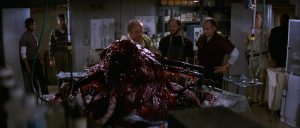
John Carpenter (U.S. 1982) 109 min. 35MM. With Kurt Russell, Wilford Brimley, T.K. Carter.
The spectacles of CGI may create ethereal worlds and untold marvels, but pixels will never achieve the sheer viscous, loathsome ickiness on display in Carpenter’s remake of the 1951 classic (The Thing from Another World). Rob Bottin and Stan Winston’s effects co-star with an ensemble cast led by Kurt Russell as researchers stuck at an isolated Antarctic outpost where they’ve run afoul of an ancient, awakened evil, in one of the bleakest films ever underwritten by an American studio (Metrograph Program notes). Introduced by Bucknell Biology Professor Tristan Stayton.
Tuesday, April 7 at 7pm
SWORN VIRGIN
Laura Bispuri (Italy/Switzerland/Germany/Albania 2015) With Alba Rohrwacher. Flonja Kodheli, Lars Eidinger. DCP. 90 min. Albanian and Italian with English subtitles.
Italian director Laura Bispuri’s intimate debut feature portrays centuries-old Balkan tradition, following a woman who – to escape the prospect of wifely servitude in her Albanian village – takes an oath of eternal virginity to live in the mountains as a man. Introduced by Lisa Dolasinki, Professor of Italian. Co-presented by Bucknell’s Italian Studies Program.
“Skipping deftly between time frames while keeping her camera close to her protagonist — played with tremulous understatement by the remarkable actress Alba Rohrwacher — Bispuri traces a journey of delicate interior shifts and reversals. In the process, she plays meaningfully with the idea that identity is as much a social and psychological construct as it is a physical reality.” Justin Chang, Los Angeles Times
Tuesday, April 14 at 7pm
RUSSIAN ARK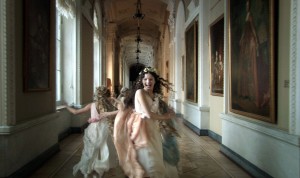
Aleksandr Sokurov (Russia 2002) 99 min. DCP. With Sergey Dreyden, Mariya Kuznetsova, Leonid Mozgovoy. Russian with English subtitles.
Sokurov’s magnum opus is a cinematic technical feat. Consisting entirely of a single roving Steadicam shot, the film narrates three hundred years of Russian history come to life in the Hermitage Museum. Over 2,000 actors appear in the meticulously choreographed sequences as, again and again, performers break the fourth wall, interacting in novel ways though the scene never cuts to break the steady, unrelenting momentum of historical hypnosis. Introduced by Professor Oksana Willis. Co-presented by Bucknell’s Russian Studies Program.
TOP OF PAGE
Tuesday, April 21 at 7pm
BRICK AND MIRROR 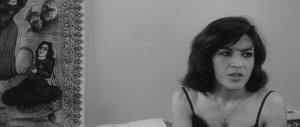 – Restoration!
– Restoration!
Ebrahim Golestan (Iran 1964) With Taji Ahmadi, Zackaria Hashemi, Goli Bozorgmehr. 126 min. DCP. Farsi version with English subtitles.
Painstakingly restored by the Cineteca di Bologna, Brick and Mirror returns to the big screen to take its rightful place as a milestone of Iranian and international post-war cinema. Already a giant of letters in Iran, writer-director Ebrahim Golestan turned to documentary filmmaking in the early 1960s; bringing together social realism with poetic expressionism, Golestan’s urgent story – of a taxi driver who finds a baby abandoned in the back seat of his cab and searches for its mother over a single long night – grows increasingly allegorical as it reveals a corrupt urban elite and intellectual class unable to grasp the roots of its own demise. Dismissed by critics of the time as “arty,” the film was later admired by Jonathan Rosenbaum as “a mix of Dostoevsky and expressionism.” Formally innovative, Brick and Mirror’s use of soliloquy reflects both Golestan’s regard for Orson Welles and the oral storytelling and frequent use of metaphor in Persian culture. The film was also the first to use direct-sound in Iranian cinema, with minute attention given to environmental sound, emphasized by the lack of a score (adapted from UCLA Film & Television Archive program notes).
